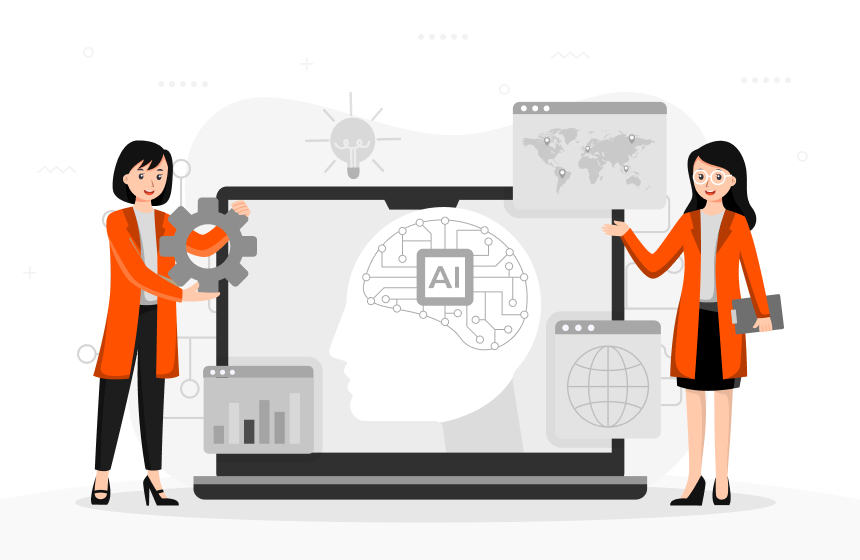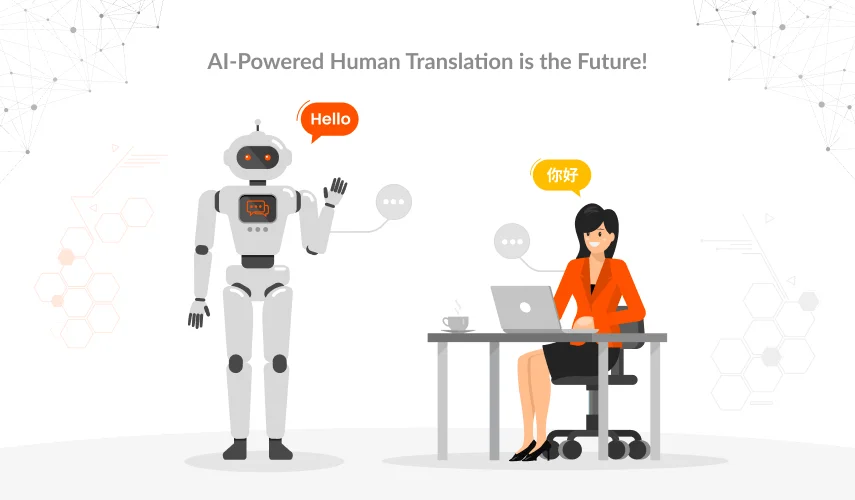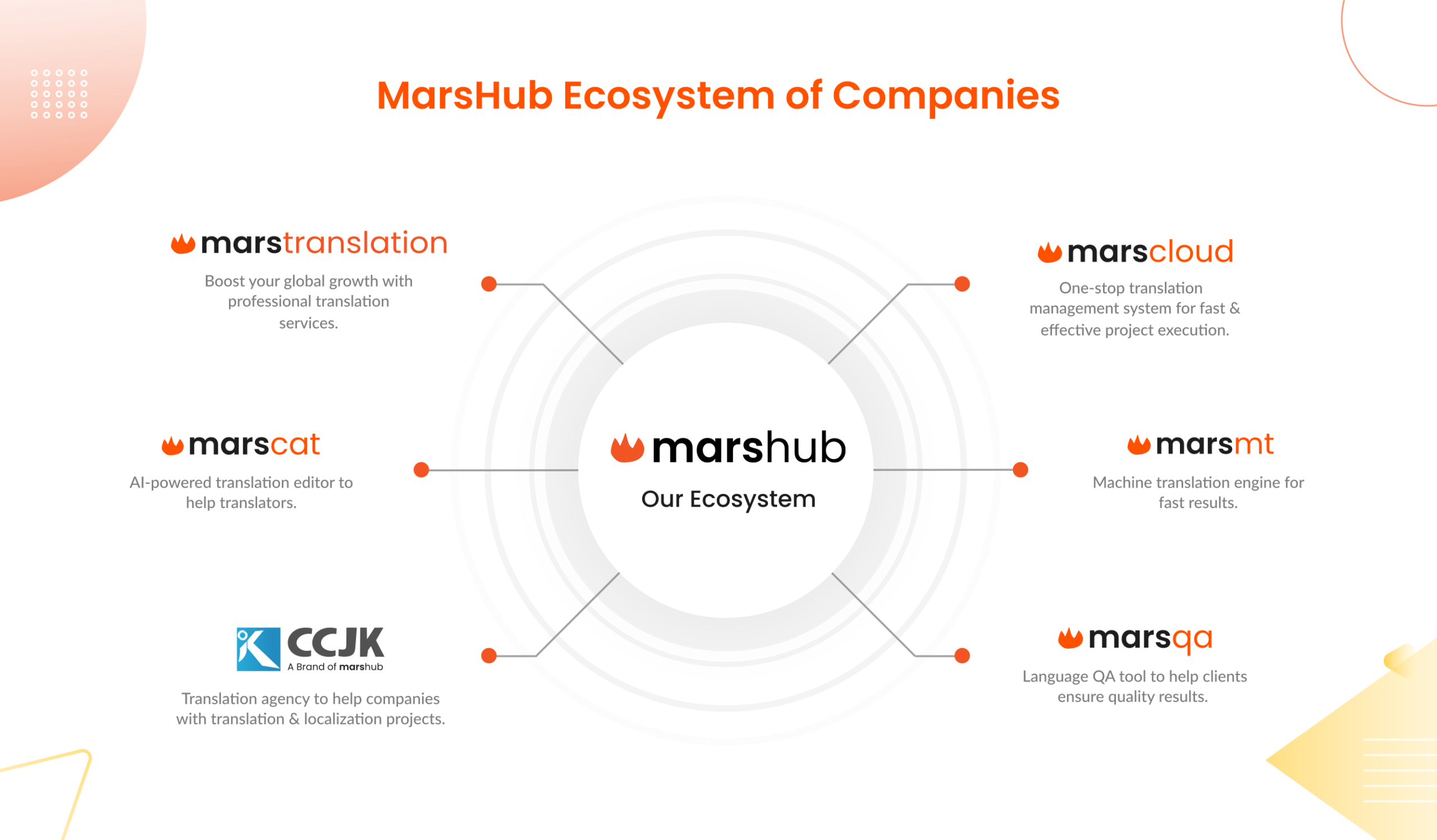AI has already taken over the globe. From our everyday business operations to day-to-day personal tasks, AI brings more speed, efficiency, and effectiveness to whatever we do. AI technology has also been a game changer in the tech and business landscape, and now it is transforming the translation industry and how businesses do brand localization.
Over the past few years, localization and machine learning technologies have gone through great developments that hugely contribute to the growth of the industry. With the rising demand for high-quality translation tools, the integration of AI in TMS systems is also increasing. We have seen a drastic change in the translation industry, and many advanced technologies are coming around to make localization simpler, more efficient, and easier than before.
In this blog post, we’ll be evaluating the impact of AI on TMS technology and the localization industry as a whole.
AI is Transforming the TMS Technology
1. Advanced MT Tools
There is a continuous demand in the industry for tools that provide high work efficiency with great speed and accuracy. We have seen how machine translation tools evolved and improved, and undoubtedly AI technology has a lot to do with it. With the arrival of modern neural machine translation models, businesses have stopped using traditional methods and models (statistical and rule-based approaches) for translation generation. AI integration in the TMS tools has enhanced their efficiency in creating in-context and accurate translations. There are many studies stating that there will be rapid growth in the use of neural machine translation in the coming years.
2. Automated Localization Processes
AI has also enabled automation in the localization processes and helped language service providers streamline their workflow. Using an AI-powered localization management system, you can easily extract content from code for translation, manage file formatting, and perform QA testing seamlessly. It leads to faster translation that reduces the time to market the content in a foreign market. More work can be managed with minimal human involvement, which significantly reduces the LSP company’s need for manual staff.
3. Fast And Cost-Effective Localization
AI-based translation tools can enhance the speed of translation processes and allow professional linguists to generate translations quickly. AI algorithms along with translation memory technology accelerate the process of translation generation in a cost-effective manner. With the help of translation memory, previously saved translation segments are reused to create quick outcomes. It also reduces the time and cost required to finish a translation project.
4. Terminology Management
To ensure the consistency of your translation in various regions, you have to create a translation glossary containing definitions and connotations for all complex terms. It is also quite helpful for the translation teams to have a detailed idea about the translation project at hand, and they may approach it the right way and avoid making errors. So, if you have multiple translators working on a translation project, the tone and style will remain consistent.
Challenging AI Integration in Localization Processes
Although the future of AI in the translation sector seems bright, there are a lot of challenges you must be aware of.
1. Quality Control
AI technology does have some shortcomings when it comes to quality control. Machine translation may lack the context and relevance to your original message. That’s why it is always recommended to do machine translation post-editing to get your translations checked by professional linguists with subject matter experience and linguistic expertise. When it comes to quality, you should not shy away from some human intervention. So, combining human expertise with AI machine tools is always the best choice.
2. Contextual Relevance
Context is something AI tools still struggle with. AI responds based on its databases, and if there are not many cultural references in its memory, it will have an impact on translations as well. Because of the lack of cultural understanding, an AI tool might confuse the context of your translations and provide irrelevant translations. That’s why you have to involve human translators in your translation process to ensure context and culturally appropriate translations.
3. High Dependence on MT Tools
Another challenge that you may face is the over-dependence on AI tools for translation management tasks. In the end, it is just a machine that can have drawbacks, and it can make mistakes. Sometimes, when you provide your translators with a professional AI translation management system, they start undermining their own intellect and totally depend on the tool. It may lead to quality issues because AI can’t replace human intelligence entirely.
4. Data Privacy Issues
When you use an AI TMS for translation generation and management, you may have to upload your private data on the tool, which poses some security concerns. Critical translation data should be handled with great care, and must not be exposed to an unauthorized entity. Especially when it comes to managing financial, or medical information, ethical considerations are even higher when working with an AI tool. Businesses have to be very careful with their choice of AI tools and make sure to work on trusted tools only.
5. Lack of Customization
Unlike human translators, most AI TMS tools only receive the source text for translations. You can’t insert your customization requirement, which sometimes can cause issues with translation consistency, and the translation might fail to achieve the desired outcomes. So, if you are looking for something fully customized, you may have challenges working with AI translation tools.
How Using AI Translation and Localization Tools Can Improve Translators’ Work Experiences?
1. No More Complicated Translation Processes
The translation is indeed a serious job that consumes plenty of time and effort. At least this is what we have been hearing about traditional translators’ jobs. The emergence of AI in translation has changed the way translators would approach or do their translation tasks. With AI-powered TMS, translation tasks have become quite easy to manage. Professional translation management tools contain machine translation tools and other automated features to organize and streamline the translation processes. It makes it much easier for translators to get away with their everyday translation hassle quite smoothly.
2. Quick Translation Generation
Managing high volumes of translation is a big challenge for translators. They are under constant pressure to deliver translation tasks on time. Moreover, managing the quality of work with such an overload of translation is also very difficult. The AI machine translation tools have made it very easy for professional linguists to manage their translation workload in time without compromising on quality.
3. Better Collaboration with Teammates
Advanced AI TMS also comes with communication features that allow the project managers to enable team collaboration through one system. It is like your digital workplace where all the in-house and remote translators can communicate with each other in real time and have productive conversations. It significantly eliminates the communication gaps among translators working on the same project remotely.
4. Higher Job Satisfaction
Undoubtedly, professional TMS tools have relieved the work burden of translators. So they can focus more on quality, accuracy, and clarity. Advanced AI technology acts as a strong support system for professional translators that enhances their job satisfaction, and it reduces the feeling of exhaustion at work when they have to meet unrealistic deadlines and satisfy the client’s demands at the same time.
How AI is Impacting the Translation Job Market?
1. New Job Opportunities
AI has certainly created a lot of new job opportunities in the translation industry. There is high demand in the industry for data scientists, AI professionals, and experts to manage translation algorithm behaviors. However, translators may need to have extra training in machine translation post-editing, the use of translation management systems, quality control, data annotation, terminology mining, etc. These advanced technological skills will help translators grab the best opportunities available in the market.
2. Better Paying Jobs
After the Industrial Revolution, when manual labor was shifted to machines, it didn’t replace humans but created better jobs for them. The same thing is happening with the emergence of AI in the translation industry. No matter how well machines can translate text, we will still need expert translators for quality assurance, editing, TMS management, and customization. So, the job roles might change, but the demand for professionals will only increase with better-paying jobs.
3. High Demand for Experts
Now, more companies are expanding into foreign markets to enhance their customer base and earn more revenues. It also increases the demand for skilled and highly qualified translators with advanced linguistic skills that will help global companies spread their brand message worldwide. Companies are looking for subject matter experts who are not just good at translation but also have an understanding of the latest tools and methods to achieve higher work efficiency and productivity.
4. Required Updated Skill
It is high time for translators to upgrade their linguistic and technological skills to make the most of the changing translation industry landscape. Translators have to evolve to stay relevant and updated with all the latest trends and tools of the trade. The translation job market has a lot of career opportunities for translators, so they need to embrace technology to make things turn in their favor.
Using AI in TMS may Raise Ethical Concerns!
1. Platform Bias
Depending on what type of data is fed to an AI algorithm, it will have a huge impact on its opinions, suggestions, and narratives. Yes, your AI tools can be biased, if the data provided to them is biased. Having said that, it is also possible to create an AI tool that is right-wing or left-wing, and the user will get their outcomes depending on those biases. If an AI data scientist is intentionally doing it, it is quite an unethical approach in the first place.
2. Data Confidentiality
Whenever you upload data to an app or platform, there is some sort of security and privacy threat attached. Especially, while dealing with sensitive information, you don’t want to expose it to any unauthorized party. So, any language service provider system, offering AI-based translations, must ensure the privacy of client’s data and protect their information confidentiality.
3. Transparency
There are many TMSs available in the market already; however, finding a trusted provider is still so hard. AI algorithms are complex to understand, and you don’t really know how they generate translations. It is important for LSPs to maintain their translation procedure transparency to build their reputation and gain the trust of customers.
4. Intellectual Property
AI machine translation tools may have to face copyright issues and intellectual property concerns. To survive in a market for the long term, companies must keep their processes compliant with intellectual property laws and regulations. They should know their limits and respect the rights of copyright stakeholders.
What to Consider While Choosing the Right AI TMS Tool for Localization?
Finding a suitable TMS for your translation project is hard. Especially when there are plenty of options available online. Some important points to keep in mind while looking for a reliable TMS tool are as follows:
1. Target Language Pairs
Firstly, you must choose an AI TMS that is specialized in your target language pairs. It will have a huge impact on the overall accuracy and performance of your TMS tool. Specialized tools are also likely to better understand your context because of their understanding of linguistic nuances.
2. Domain Expertise
Not all AI-powered TMS tools are created equal, so you better go for the one that has subject matter expertise in your domain of business. For instance, if you are dealing in the legal and financial industry, you must choose a TMS that has expertise in this industry. Similarly, for medical translations, there are other TMS tools available.
3. Quality Assurance Features
You must ask your language service provider about the QA testing processes that they use to ensure high-quality translations. Like whether they do manual proofreading, use an automated tool, or combine both manual and automated methods for testing translation quality.
4. Relevance and Accuracy of Outcomes
When you do translation for business expansion, the context and cultural relevance matter the most. Your purpose is to resonate with the customers and clearly communicate the brand message. If your tools are unable to provide relevant translations, it will create issues for your brand.
5. Security Measures
It is important for businesses to prioritize data security while working on AI-based TMSs. The TMS service provider must ensure the confidentiality of data, follow industry standards and security protocols, and perform proper security measures to avoid information breaches.
Wrapping Up!
AI technology has totally revolutionized the translation industry and how businesses go about their brand localization. Whether you are a language service provider or a professional linguist, you have to cope with the changing landscape and embrace advanced technology; otherwise, you will be left behind in the globalization race.
If you are looking for a professional translation management system, you can try MarsCloud’s free 14-day trial. It is a feature-rich system designed to make your translation and localization project management simpler and cost-effective.



